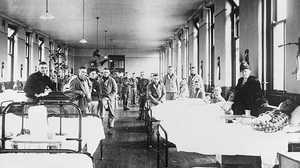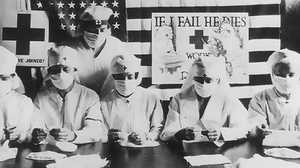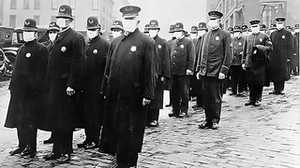Dr. Alfred Crosby, author of Epidemic and Peace 1918: America's Forgotten Pandemic, spoke with American Experience in 1997.
Interview transcript:
A Bad Rap on Spain
It was called the Spanish influenza. It was just completely a bad rap, by the way, on Spain — it’s called the Spanish influenza because Spain, not being a belligerent in the war — Spain got into everybody’s newspapers fast. What happened in Germany, France, the United States, Great Britain was subjected to censorship. So, in the world press, the only nation whose plight, vis-á-vis flu, was widely publicized was Spain’s, so everybody said it’s the Spanish flu. It shouldn’t have been called the Spanish flu anymore than it should have been called the Japanese flu.
This Couldn’t Be Influenza
Many of them did not identify it as influenza because, it didn’t fit the definition. Influenza does not kill people in great numbers; influenza does not particularly effect young adults; influenza is a pest, it’s not a slaughterer of human beings. So they fumbled around in their diagnoses. A Welch suggested plague, other people suggested meningitis. Some of them went over the top in patriotism and decided to blame it on the Germans and some sort of poison gas which U-boats had released on the beaches of the United States. They came up with a hundred different diagnoses and so often avoided the obvious one because — which was influenza — because influenza does not kill people in large numbers, so this couldn’t be influenza.
Flat-Out Denial
The first reaction of the authorities was, for many of the most important ones, just flat-out denial. This was simply too large an event for them to deal with, not only in policy, but to even to think about constructively. So,the chief health officer of New York, a man named Royal Copeland, denied it when it became undeniable. He said it wasn’t any great danger. He talked a good game throughout the entire, epidemic and there were other people like him right across the United States. It’s easy to blame these people in retrospect, but, of course, we have the advantage of hindsight. This was simply too big for them to take in as fast as they needed to take it in. If it had been a slow-moving epidemic, maybe they would have had a month, two months to realize, yeah, it really is happening out there. Instead, down the telegraph wires would come these almost unbelievable stories. If they were believable you’re supposed to do something, if they were unbelievable, you didn’t have to do anything. A lot of health officers were, and a lot of politicians to whom the health officers would have to— people they’d have to convince, preferred not to face it.
Influenza is Very Democratic
There’s an old American tradition that we are the most moral people on the face of the earth and therefore these visitations from an angry God don’t hit us, they hit somebody else. Most epidemic diseases hit the poor harder than they do the rich, the elites; and so a lot of the elites wouldn’t face up to this. The way out of the excuse of not facing up to this is by saying, “It won’t hit us on the hill, it’ll hit those people down there, the immigrants in the lowlands.” This had been true about tuberculosis and a number of the most prevalent diseases of the time, but influenza’s very very democratic.
No Correct Thing to Do
There were two enormously important things going on at once and they were at right angles to each other. One, of course, was the influenza epidemic which dictated that you should sort of shut everything down; and the war which demanded that everything should speed up — that certainly the factories should continue operating. You should continue to have bond drives. Soldiers should be drafted and sent to the camps jammed into barracks, put on boats with bunks six high, and sent off to France. One of the great tragedies of the situation is that there was no correct thing to do. You can’t look back and say, “If our officials had only done the correct thing.” There wasn’t any correct thing to do.
Hold Your Breath
We know now how flu spreads. It spreads by breath, it spreads through the air, which is why it moves so fast. To get typhoid, you have to drink infected water, but with influenza, all you have to do is breathe in while somebody else is breathing out. If you’re on a subway car, in an elevator with somebody with influenza who sneezes, that air will be utterly full of viruses and you will breathe them in, unless you can manage to hold your breath for a number of minutes. I don’t think there’s any disease that moves any faster through a population than influenza because it is perfectly adapted to be breath-borne. It’s a disease of the lungs and every time you breathe out, you breathe out all kinds of virus and, in this case, you were exhaling flu virus.







